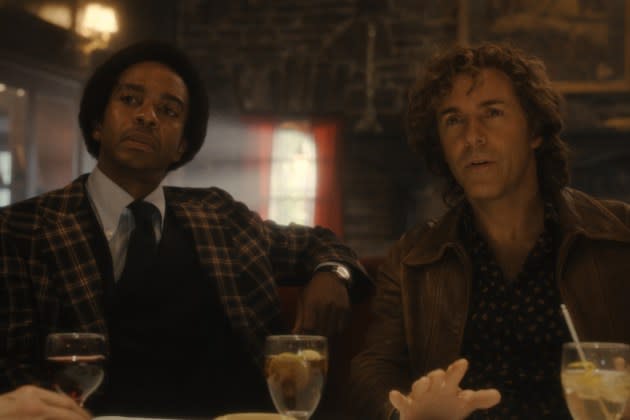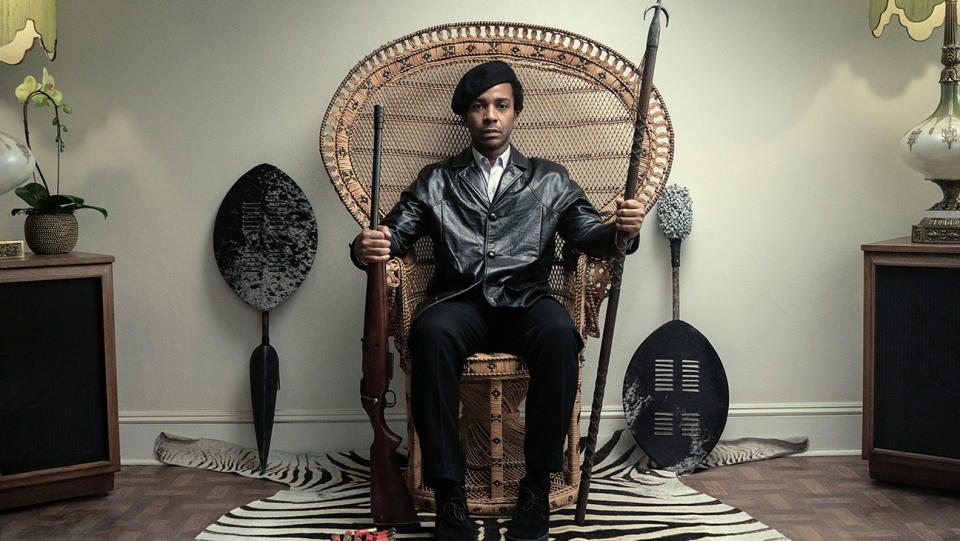André Holland on the Tough Conversations He Had to Portray Huey P. Newton in ‘The Big Cigar’

In the opening narration of The Big Cigar, actor André Holland, who portrays Black Panther Party co-founder Huey P. Newton in the Apple TV+ biographical drama, delivers a disclaimer about the events that will be portrayed onscreen: “The story I’m about to tell you is true, at least mostly true, at least how I remember it,” Holland says. “But it is coming through the lens of Hollywood, so let’s see how much of my story they’re really willing to show.”
The statement both echoes concerns Holland had about taking on the project and sets the tone for the element of humor that underlies the retelling of Newton’s first dealings with the Hollywood machine when bigtime producer Bert Schneider, in his zeal for social justice causes, nearly begs the revolutionary leader to help him spread his message of resistance. Biting off far more than he expected to chew, the two end up pulling off one of the grandest productions the industry has ever seen when Schneider helps Newton evade false police charges and escape to Cuba under the guise of filming a new movie.
More from The Hollywood Reporter
“I wanted to know how much of the history of the Panthers are we going to be able to get into, because the story on its face is a caper, essentially, about getting Huey out of the country and if not done well, I felt concerned that it could gloss over the important historical moments that I wanted to make sure we touched,” Holland tells The Hollywood Reporter in the conversation below.
Beyond the high-action heist of sorts that comes to be at the center of the six-episode limited series developed by Jim Hecht, the show, based on the 2012 Playboy article, “The Big Cigar,” written by Joshuah Bearman, does indeed delve into many personal facets of Newton’s life, including his motivations as a social revolutionary, as well as the internal demons and external forces that kept him from reaching his full potential with the Black Panther Party and as a Black man in Oakland, California, in the 1960s and ‘70s.
Holland’s turn as Newton afforded him the opportunity to work with actors he’s long adored, from Don Cheadle, who directed the first two episodes of the series, to Glynn Turman, who portrays Newton’s father, Walter, with whom he had an estranged relationship.
“One of my favorite memories of the whole shoot was shooting with Glynn,” Holland recalls. “We would be sitting at lunch just talking, and he’d be telling me all these stories about this period and other actors and people who I admire. I also learned so much from watching him. There’s one scene where we did probably three takes, maybe four, and I’ll never forget the last take that he did. Something just happened and I was like, ‘Oh my God, that’s what acting is.’ He just dropped into it, and it was magic. Everybody felt it.”
Below, Holland talks with THR about his caveats for taking on the role of Newton and what he’s come to understand about the misunderstood leader.
***
This series portrays Black resistance in a way that audiences have been asking for, which is to see characters as empowered versus victims. What early conversations did you have with Jim Hecht and showrunner Janine Sherman Barrois about how this story would be told, and how did that influence your decision to come on board?
Thank you for that. One of the first things I wanted to know was, whose perspective is the story being told from? And they said it was from Huey’s perspective. I also wanted to know how much of the history of the Panthers are we going to be able to get into because the story on its face is a caper, essentially, about getting Huey out of the country and if not done well, I felt concerned that it could gloss over the important historical moments that I wanted to make sure we touched. I also wanted to know if we had real support in the way of a historical consultant who could make sure that we were doing everything the right way, and that we were well-researched and grounded in the truth, which we did. And then we had to go make it and continue to have all those conversations and wrestle with people. It’s not always a smooth thing to make such a complicated story, but that’s what got me excited about it and got me on board.
Did you know this story before seeing the script?
I didn’t know it at all. In fact, when I first read it, I was like, “Is this true?” But Joshuah Bearman, who wrote the original article, did such a great job and researched it for a very long time, and spoke to everybody. I think we can trust that the things he identified as being true and that are undergirded by facts are really what happened. We fictionalized some things in the series for sure, but it is inspired by true events.
Newton wrote a lot of scholarly works. Did you read any of those, and if so, which did you feel gave you the most insight into who he was?
I read pretty much everything I could get my hands on that he wrote. I also found it really interesting to read what other people said about him. Elaine [Brown]’s book, for instance, and what she had to say about him, which is different from what he had to say about himself. There were so many different perspectives on who he was and what he was about. Ultimately, I had to make my own choice regarding how I was going to enter into the character, and one of the things that I found really instructive was looking at his childhood: where he was raised, how he was raised, how he experienced a lot of bullying as a child, how he was terribly shy and insecure about, particularly, his ability to read and he didn’t ever want to be in public speaking. He was terrified of it, and I never knew that. There was always a battle within him to try and find that courage and that voice. I found that to be a really interesting contradiction.
Elaine Brown and Bobby Seale are still alive along with Newton’s later wife, Fredrika. Did you talk with any of them as you prepared for this role?
I have since become friendly with Fredrika. I spent some time up in Oakland. We didn’t get a chance to spend as much time together during the shoot, but we have since gotten to spend some time together. And our consultant, who I became very, very close to, is very well connected with a lot of former Panthers, so I was able to get a lot of information from him as well. I watched so many things, read so many things, listened to music. Everything that I could think to do, I did. Some people are keen to talk, especially to Hollywood folks, and others are not. So it was a little bit of a delicate dance around that, and I wanted to be respectful of people’s space.

There are a lot of scenes that appear to be pretty demanding, both emotionally and physically. Which were most challenging for you?
The water scene in the finale was a little scary, because I don’t know how to swim so that was not fun. And then also the soul-breaker scene early on, when he’s in solitary confinement, that one, emotionally, was pretty heavy. It’s only a short sequence in the actual show, but it took us probably a day or two to shoot. We did a lot of work on that, and it was pretty taxing, emotionally and physically, but Don Cheadle helped me through it. He’s a really good director and a great actor, obviously, so we were able to find our way through it.
How would you say Don Cheadle set the tone for the series by directing the first two episodes?
That was also a big part of the reason why I agreed to do this. I really admire him as an actor and as a director, and I felt sure that I’d be safe in trying to do this very, very difficult thing. We were very much on the same page in terms of this being an opportunity for us to share with people more about the Panthers. The question was, in the framework of what we have to work with, can we create something that has the potential to do some work in the community? And we felt like we could, and that’s what we tried to do. I think if nothing else, I hope people walk away from it with an increased desire to learn more about the Panthers. And I hope they go out and find that information.
Gwen, Newton’s partner, increasingly starts to find her voice as it relates to their relationship towards the end of the series. What was it like working with Tiffany Boone in that role?
Tiffany Boone’s amazing. The two of us are like brother and sister, and we had such a good time. One thing we felt was that inside of this caper, the heist, the history, the drama, is a Black love story, too, set against this ongoing struggle for Black liberation. And I felt there was potential for this to be a really beautiful little story and it was fun getting to craft that with her. I feel like she should just be in everything forever. She’s so good, so funny, so emotional. She could do anything. I hope that this represents an opportunity for her to go and do many, many more things.
Did you find yourself asking what side of the story you might’ve been on had you lived through this period in history? Did you discover any similarities between yourself and Newton?
For sure. I think that I can often present as polished, to a degree, and controlled, and that is a part of my personality. But as we say down south, “I don’t take no tea for the fever,” either (laughs). So there is that part of me to, too, that can be committed, let’s say, to my ideals and to my principles. I don’t like to back down.
Just this past August, the Smithsonian ran an article about Newtown titled “The Misunderstood Visionary Behind the Black Panther Party.” What did you come to understand about who he is ultimately?
Complicated. Really, really complicated. I think what I was impressed by was his intellect, his sensitivity, which I wasn’t aware of. His ability to organize and galvanize people. Honestly, there were other sides of his personality, too, that were often harmful, but I think he was a human being. He was a whole person, not just the guy who’s sitting in the wicker chair, and I really, really appreciated getting to see all of who he was, and really appreciate him and the work that he did, and also be critical of the harm that he caused at the same time.
The Big Cigar premieres on Apple TV+ Friday with the first two episodes, followed by new episodes every Friday.
Best of The Hollywood Reporter

 Yahoo News
Yahoo News 
